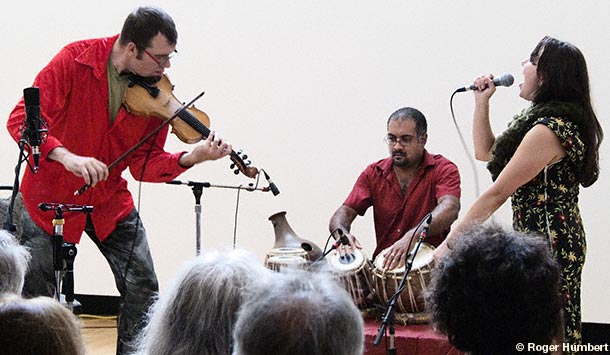| Post-concert, I am lying on the soft, green lawn of the Macdonald Stewart Art Centre. My back rests on one of six long curves of raised earth flowing from the motor of the aluminum fishing boat several yards away. Bow in the air the boat sits, stern on the ground, partially filled with the weight of shining steel water. Art and nature meet here.
I feel the breeze turn from light and warm to brisk and cool. The sun that made the skin of my face pulsate with heat is obscured for a time by clouds. The cicada’s high-pitched sustain starts to falter, then cuts off. Young women’s voices move closer. I listen with heightened awareness, the after-effect of the world première I just heard.
I can’t say what pieces were played. No titles were cited. They were creations unique to their time and place and will never be heard again. The three artists, Tanya Tagaq Gillis, Oliver Schroer and Ravi Naimpally, had all played with each other in different configurations at different times, but this was the first time they had performed as a trio.
|
| It was a performance beyond words, in the way that instrumental music is. Tanya Tagaq Gillis is a 'singer', but no words were sung. Tanya has used Inuit throat singing to bring an entirely new way of vocalizing into music. Primal, simultaneously earthy and otherworldly, it can be as rhythmic as Ravi Naimpally’s tabla work and as soul striking as Oliver Schroer’s 'fiddle', or the howl of a wolf. This trio is unearthly, beauty to the power of three. Their rhythms are permeating, their sounds emotive. Warning — may cause eyes to tear. But there are times of joy as well. As when Tanya releases her long flowing hair.
And there were the incidental sounds. The small periodic cough that could no longer be suppressed. A child wailing — more than once. Usually irritating when the quietest tap on the tabla is important, these sounds were just there, part of nature, or even incorporated into the music as when Oliver Schroer echoed a child’s outburst on the fiddle. I wondered if the vocalizing of Tanya Tagaq Gillis had provoked the child to respond.
Someone walked by a blind man’s dog. A misplaced step, the dog yelped, began to rise, then settled. Tanya started a deep throaty growling. My eyes were on the dog as the breathy growls were cut off shorter and sharper, intensifying and accelerating. The dog remained quiet and still, muzzle planted between his master’s shoes, eyes closed. The fiddle placed intermittent notes, then phrases. Soft tablas bubbled underneath. Seated, fiddle in his lap like a mini-bass, Oliver Schroer struck the strings with the bow in his right hand and plucked them with the fingers of the left. Eyes closed. We were back to the sounds of the magical trio.
In this organic music, with its naturally evolving flow, art and nature met.
|


